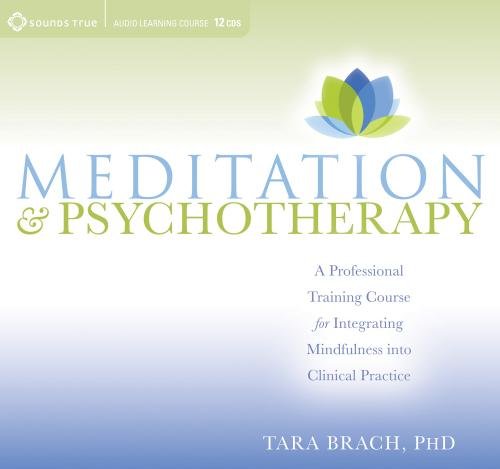
Healing is a process of coming home to one’s authentic self-to the loving presence that is the ground of our being. But we often get trapped by the false refuges of fear-based habits and judgmental thoughts. To help us bring the fruits of mindfulness practice into our lives for healing and transformation, Dr. Tara Brach offers Meditation and Psychotherapy. Created for mental health professionals and illuminating to anyone interested in the core techniques, practices, and insights of Buddhist psychology, this experience-focused audio learning program helps us find our way back to natural presence, a place where peace and our deep love for life grows.
Learning How to Face Our Tangled Emotions and Release Our Limiting Beliefs
There are many skillful means that we can use to train ourselves and our clients to become aware, teaches Brach, a psychotherapist and meditator of more than 30 years. But they all lead to one essential question: Can I be here in this moment? Using her R.A.I.N technique, a four-part process that helps us learn how to stop running away from our tangled emotions and start to lovingly face them, we’ll investigate and unblock the beliefs that cause suffering. Guiding us through meditations and practices on mindfulness, lovingkindness, forgiveness, allowing, and more, Brach shares key tools and expert insights for moving through this liberating process so that we can open and allow our lives to unfold, moment by moment.
“Mindfulness can strengthen our attention, awaken compassion and empathy, and expand our acceptance of our own inner states,” teaches Brach. Meditation and Psychotherapy draws on the strengths of mindfulness meditation and the practice of modern therapeutic methods to help clear the emotional blocks holding us back.

A Powerful Workshop on Emotional Healing This collection is not just for therapists, but her teachings are for anyone looking for ways to deal with the gamut of difficult emotions we all deal with. We learn to be present and give space to emotions without identifying with them. She expounds on the acronym “RAIN,” which stands for recognize/acknowledge when a strong emotion is present, allow or acknowledge that the emotion is there, investigate–not intellectually–but viscerally to witness what is happening in the body, and not identify with what is there, while giving it space to be. In one of her books she compares this experience to putting an ink drop in a thimble (resisting emotion and trying to put it down) or allowing the emotion to exist in a vast lake, where it spreads out as if it is barely there. The vastness of the space of compassion is like the lake.Tara Brach is most powerful teaching I have experienced for dealing with “self aversion” with a balance of mindfulness and self-compassion. Tara’s…